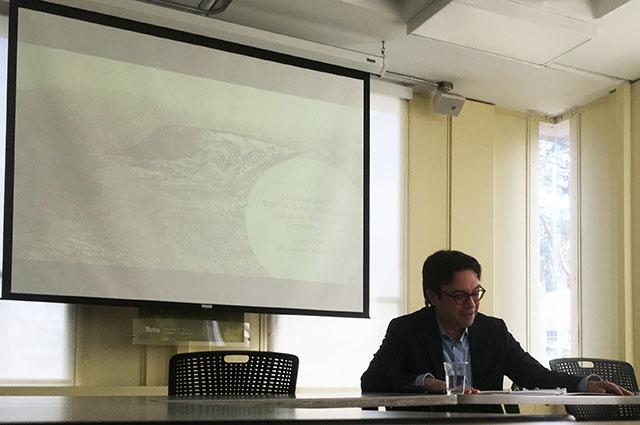At Tisch College Talk, Jeremy Eichler Explores Music and Memory

On March 25, Tisch College hosted a conversation with Jeremy Eichler, Public Scholar at the National Endowment for the Humanities and classical music critic for The Boston Globe, who led a fascinating discussion on how works of music can carry forward memories of the past. The event was co-sponsored by the Department of Music.
Eichler’s talk was part of Tisch College’s Program for Public Humanities, an initiative that explores, promotes, and celebrates the connections between the humanities and civic life, and the potential impact of artistic media and other forms of expression on issues of public concern. Led by Prof. Diane O’Donoghue, Tisch College’s Senior Fellow for the Humanities, each year the Program hosts a series of spring semester talks that bring artists and academics to Tufts University to discuss their work in this field.
In his recent presentation at Tisch College, Eichler spoke about his research into using music as a means of cultural memory, specifically related to World War II and the Holocaust. He described an intuitive connection between music and memory: “When you hear a song on the radio, it can transport you back to an earlier moment in your life,” he said.
Eichler described his work on a current book project, one that will explore that intersection and “will attempt to re-inscribe musical works with the fullness and histories that are contained within then.” He also shared why he believes there is urgency in this work.
“Seventy-five years after the end of the Second World War, the last generation that experienced the era directly and is still capable of telling you its own stories about the period is rapidly disappearing,” he said. “There will be a time when these inscriptions in the culture of the time will be among the only ways to encounter this increasingly distant past.”
Those memories can serve as a vehicle for profound civic and political impact. Eichler discussed his research on Russian composer Dmitri Shostakovich’s 13th Symphony, known as Babi Yar. Adapted from a work of poet Yevgeny Yevtushenko, it was inspired by the events of the 1941 Nazi massacre of Jews at Babi Yar, near Kiev, the largest mass killing perpetrated by the Nazi regime and its collaborators within the Soviet Union. It has been called “the largest single massacre in the history of the Holocaust;” between 100,000 and 150,000 people were killed there.
But much of the massacre was covered up, Eichler described. “First the Nazis destroyed the evidence, then the Soviet Union destroyed the memory. Together they formed the perfect seal,” he said.
In his symphony, Dmitri Shostakovich—one Russia’s most prominent composers, and one of the major composers of the 20th century—sought to break through that seal. Completed in 1962, it the piece criticized the lack of commemoration of the massacre and, more broadly, the Soviet Union under Joseph Stalin. Indeed, the Babi Yar symphony remains one of the most prominent artistic condemnations of Stalinism.
The Program for Public Humanities’ spring events concluded on April 17 with a program focusing on the work of Quorum Boston, an organization dedicated to performing the work of both historical and contemporary queer composers, in various community settings. This Tisch College series will return next year with more exciting speakers!